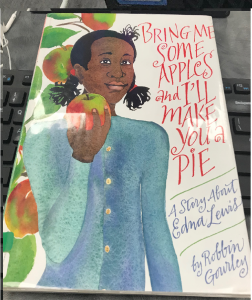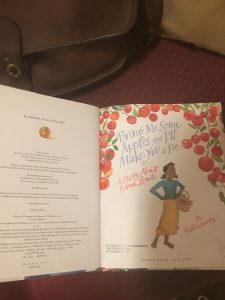Author(s), Illustrator/Photographer: by Robbin Gourley.
Publisher and Year Number of pages: Clarion Books, 2009, 45 Pages.
Genre: Historical Fiction and Biography.

Descriptive Annotation: The cover features the protagonist, Edna Lewis, brandishing an apple of the sort used by the future chef at Freetown, Virginia. Watercolors depict the sons and daughters of former slaves in their community, gathering crops and making a living free from the bulk of anti-black persecution of their brethren further south under the post-Civil War Jim Crow laws. The book covers the harvest of crops, which are baked into delicious recipes that can be found at the back of the book, and the process of getting them from field to fork. Breaking the mold of standard imagery of the era in our collective mindset, all of the workers in Freetown live relatively pleasant lives, seemingly unburdened by segregation due to the town being formed by and for African-Americans, and not a single white person in sight for the entirety of the text. Prior knowledge of what the community of Freetown was, and perhaps research on Edna Lewis’s long cooking career could help further classroom discussions immensely.
Classroom Application: In this picture book, the characters are all assigned different tasks in farming the field, which would be ideal for some role-play for those children who live in suburban and urban settings who have never experienced rural life and its trappings before. Accompanied by a field trip to a local farm (especially in the Bloomington-Normal area) would be an excellent idea and a way to broaden one’s knowledge of Illinois’s agricultural traditions, supplemented by the Virginian ones seen in the book. I certainly never heard pecans falling from the sky during harvest season: “The leaves are falling, and so are the nuts. Ping-ping-ping. Pecan and walnuts fall on the rooftop. The family fills baskets full of them” (Gourley, p. 34).
Linguistic and Cultural Diversity Analysis: Gourley covers the legacy of slavery, and Jim Crow, in a way that can easily be remembered, and notes the historical significance of Freetown at the last page of text before the recipes come in: “Edna Lewis was born in 1916, in Freetown, Virginia, a community founded by her grandfather and two other emancipated slaves” (Gourley, p. 40). The author speaks the dreams of Edna to become a famous chef towards the end of the book, too: “How about we make a summer pudding or a cobbler? Or just have a bowlful of berries with sugar and cream?” (Gourley, p. 19). Such a bevy of ideas for making food with the berries are indicative of a creative young mind, and it is crucial that teachers encourage that kind of pluck and ingenuity so that they can make the next generation of innovators like Edna Lewis reach new heights of greatness.

